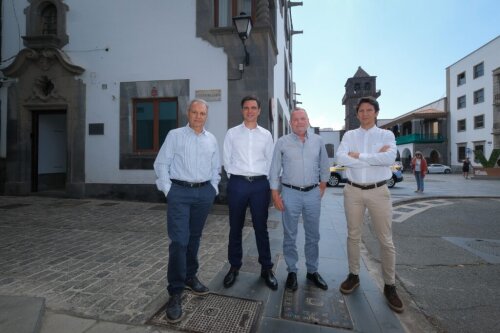Best Due Diligence Lawyers in Las Palmas de Gran Canaria
Share your needs with us, get contacted by law firms.
Free. Takes 2 min.
List of the best lawyers in Las Palmas de Gran Canaria, Spain
About Due Diligence Law in Las Palmas de Gran Canaria, Spain
Due diligence is a fundamental process in Spanish legal and business environments, especially in Las Palmas de Gran Canaria. It involves a detailed investigation and evaluation of either a business or a property before a transaction, such as a company acquisition or real estate purchase, is finalized. In Las Palmas de Gran Canaria, due diligence is essential to secure legal compliance, evaluate risks, and ensure all facts are known before making significant commitments. It encompasses legal, fiscal, and financial checks and is a standard practice among investors, entrepreneurs, and private individuals dealing with high-value transactions.
Why You May Need a Lawyer
There are various circumstances in which people in Las Palmas de Gran Canaria require legal assistance with due diligence. These include:
- Purchasing or selling real estate, where confirming ownership, debts, planning permissions, and legal encumbrances is critical. - Mergers or acquisitions, where reviewing contracts, company debts, regulatory compliance, and employment obligations is necessary. - Investing in a business, where verifying the company’s legal and financial health is important. - Setting up a business or entering joint ventures, as legal documentation and partner reliability must be verified. - Inheritance or succession planning, which may require checking property titles and associated liabilities. An experienced local lawyer can clarify legal obligations, mitigate potential risks, and ensure all local laws are observed throughout the process.
Local Laws Overview
Las Palmas de Gran Canaria, as part of Spain, observes both national Spanish laws and specific regional provisions of the Canary Islands. Important legal aspects for due diligence include:
- The Spanish Civil Code regulates contracts, property law, and obligations, which form the basis for most checks. - Corporate and company law in Spain requires notarial and public registry reviews for business transactions. - Land and Property Registries (Registro de la Propiedad) are regularly consulted to confirm property ownership and encumbrances. - Urban development laws and local planning regulations apply to real estate and construction matters. - Tax considerations are influenced by the Special Economic and Fiscal Regime of the Canary Islands (REF), impacting business and asset transactions. - Anti-money laundering and compliance regulations govern particular transactions and oblige due diligence for source of funds. Understanding and adhering to these laws ensures the due diligence process is comprehensive and legally valid.
Frequently Asked Questions
What is due diligence and why is it important in Las Palmas de Gran Canaria?
Due diligence is a detailed review of a business, property, or investment opportunity. It is important in Las Palmas de Gran Canaria because it helps to identify legal, financial, or tax risks before finalizing a transaction.
Do I need a lawyer to perform due diligence in Las Palmas de Gran Canaria?
While not legally required for every transaction, it is highly recommended to have a local lawyer, as they understand local regulations, can spot hidden risks, and provide legal protection.
What documents are typically reviewed during property due diligence?
Common documents include property deeds, land registry extracts, planning permissions, community statutes, proof of tax payments, and records of utility bills or potential liens.
How long does the due diligence process usually take?
The timeframe varies depending on the complexity of the transaction, but most due diligence processes in Las Palmas de Gran Canaria take between two to eight weeks.
What are common risks if due diligence is not properly conducted?
Risks include unregistered debts or liens, ownership disputes, planning or building violations, tax liabilities, and undisclosed contractual obligations.
Are there special due diligence concerns for foreign buyers?
Yes, foreign buyers should check legal residency requirements, currency transfer regulations, and ensure that all documentation is properly translated and legalized if necessary.
Can companies in Las Palmas de Gran Canaria be subject to specific local taxes?
Yes, companies may be subject to special local taxes and benefits under the Canary Islands’ Economic and Fiscal Regime, requiring proper assessment during due diligence.
What should I check when buying a business in Las Palmas de Gran Canaria?
You should confirm ownership, review financial statements, verify licenses and permits, check for pending litigation, analyze labor contracts, and review all material contracts.
Is environmental due diligence necessary?
Yes, especially for property or business transactions, to confirm there are no outstanding environmental liabilities that could result in future legal action or costs.
Can a lawyer assist with negotiations based on due diligence findings?
Absolutely. Lawyers not only help discover issues but can leverage this information to negotiate better terms, request corrections, or even advise walking away from risky transactions.
Additional Resources
The following resources and institutions can be valuable for individuals seeking guidance or official information about due diligence in Las Palmas de Gran Canaria:
- Colegio de Abogados de Las Palmas (Las Palmas Bar Association): Offers legal referrals and guidance. - Registro de la Propiedad (Property Registry): Main source for property ownership and encumbrance searches. - Cámara de Comercio de Gran Canaria (Chamber of Commerce): Provides business and legal resources for corporate due diligence. - Agencia Tributaria Canaria (Canary Islands Tax Agency): Information on local tax obligations and incentives. - Ayuntamiento de Las Palmas de Gran Canaria: Local government office, useful for checking planning and urban development regulations. Accessing these resources can help clarify legal requirements and supplement the advice of a qualified lawyer.
Next Steps
If you believe you need legal assistance with due diligence in Las Palmas de Gran Canaria, start by identifying the type of transaction or asset involved. Gather all available documentation and outline your objectives and concerns. Consider consulting a lawyer who specializes in real estate, corporate, or financial law in the Canary Islands. A local firm can walk you through the process, request official records, and advise you on risk mitigation and compliance. Reach out to relevant local institutions for additional information, and never sign contracts or make payments until your lawyer has completed the due diligence and confirmed it is safe to proceed. Taking these steps will help ensure your interests are fully protected and your decisions are well-informed.
Lawzana helps you find the best lawyers and law firms in Las Palmas de Gran Canaria through a curated and pre-screened list of qualified legal professionals. Our platform offers rankings and detailed profiles of attorneys and law firms, allowing you to compare based on practice areas, including Due Diligence, experience, and client feedback.
Each profile includes a description of the firm's areas of practice, client reviews, team members and partners, year of establishment, spoken languages, office locations, contact information, social media presence, and any published articles or resources. Most firms on our platform speak English and are experienced in both local and international legal matters.
Get a quote from top-rated law firms in Las Palmas de Gran Canaria, Spain — quickly, securely, and without unnecessary hassle.
Disclaimer:
The information provided on this page is for general informational purposes only and does not constitute legal advice. While we strive to ensure the accuracy and relevance of the content, legal information may change over time, and interpretations of the law can vary. You should always consult with a qualified legal professional for advice specific to your situation.
We disclaim all liability for actions taken or not taken based on the content of this page. If you believe any information is incorrect or outdated, please contact us, and we will review and update it where appropriate.









